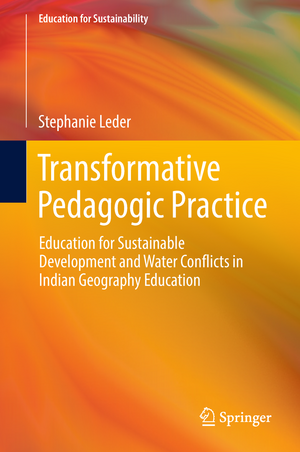Transformative Pedagogic Practice: Education for Sustainable Development and Water Conflicts in Indian Geography Education: Education for Sustainability
Autor Stephanie Lederen Limba Engleză Hardback – 21 dec 2018
Preț: 649.87 lei
Preț vechi: 764.55 lei
-15% Nou
Puncte Express: 975
Preț estimativ în valută:
124.35€ • 130.16$ • 103.50£
124.35€ • 130.16$ • 103.50£
Carte disponibilă
Livrare economică 11-25 martie
Preluare comenzi: 021 569.72.76
Specificații
ISBN-13: 9789811323683
ISBN-10: 9811323682
Pagini: 263
Ilustrații: XXVIII, 308 p. 53 illus., 46 illus. in color.
Dimensiuni: 155 x 235 x 22 mm
Greutate: 0.68 kg
Ediția:1st ed. 2018
Editura: Springer Nature Singapore
Colecția Springer
Seria Education for Sustainability
Locul publicării:Singapore, Singapore
ISBN-10: 9811323682
Pagini: 263
Ilustrații: XXVIII, 308 p. 53 illus., 46 illus. in color.
Dimensiuni: 155 x 235 x 22 mm
Greutate: 0.68 kg
Ediția:1st ed. 2018
Editura: Springer Nature Singapore
Colecția Springer
Seria Education for Sustainability
Locul publicării:Singapore, Singapore
Cuprins
1 Introduction: Education for Sustainable Development in India.- 2 Theoretical Considerations on Pedagogic Practice and its Transformative Potential.- 3 Education for Sustainable Development and Argumentation.- 4 Education and Water Conflicts in Pune, India.- 5 A Framework for Qualitative Geographical Education Research.- 6 Academic Frameworks for Formal School Education and ESD Principles.- 7 Pedagogic Practice, ESD Principles and the Perspectives of Students, Teachers and Educational Stakeholders.- 8 Opportunities for Interpreting ESD Principles through Argumentation in Pedagogic Practice.- 9 The Transformative Potential of Pedagogic Practice.- 10 Research Prospects and Strategies for Translating ESD in Pedagogic Practice.
Notă biografică
Stephanie Leder holds a PhD in Cultural Geography from the University of Cologne, Germany. She studied geography, English, biology and educational sciences at the University of Cologne and the University of New Brunswick, Canada. For her PhD thesis, she conducted in-depth research on Education for Sustainable Development in policy and practice by examining geography teaching on water resources at secondary schools in Pune, India. She was a Postdoctoral Fellow for Gender, Youth and Inclusive Development at the International Water Management Institute (IWMI) in Kathmandu, Nepal, and led studies in inter- and transdisciplinary projects within the Consultative Group of International Agricultural Research (CGIAR) Program “Water, Land and Ecosystems” in India, Nepal and Bangladesh. Currently she is a Postdoctoral Researcher for Social and Environmental Justice at the Department of Urban and Rural Development at the Swedish University of Agricultural Sciences (SLU) in Uppsala, Sweden.
Textul de pe ultima copertă
This book explores how the transnational Education for Sustainable Development (ESD) policy is being translated into formal school education in India. Stephanie Leder investigates the ESD’s transformative potential for pedagogic practice and builds a set of principles for how the global objectives of the ESD can be interpreted in diverse socio-cultural contexts. Her approach for transformative pedagogic practice emphasizes the promotion of a critical consciousness through argumentation skills. Using the case of water conflicts in geography education in India, the book reveals the contradictions between ESD objectives and curricula, syllabi, textbooks and classroom teaching at secondary schools in Pune, Maharashtra. Leder’s approach demonstrates how principles of schooling can be altered towards learner-centered, problem-posing and network-thinking teaching approaches to empower students towards reflective decision-making on the sustainable use of natural resources.
Caracteristici
Probes the gap between the transnational Education for Sustainable Development policy and pedagogic practice in India Develops principles and methods for Education for Sustainable Development grounded on critical pedagogy and the development of argumentation skills Offers original empirical analysis of curricula, syllabi, textbooks and teaching practices on the topic of water conflicts in Indian geography education Explores opportunities for innovation and paradigm change in classroom teaching and water education towards Education for Sustainable Development Contributes to the emerging body of qualitative educational geography research on sustainable development through an interdisciplinary synthesis between cultural geography, geography education and the sociology of education






